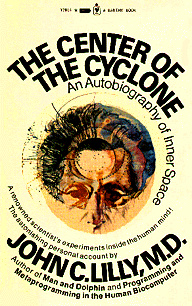|

CHAPTER 04
Following Instructions and Going with the Flow
|
or other interfered with other people and hence one was locked up.
I realized that the term "psychosis" was a cultural social
term as well as a term having to do with intemal states. As with many
people, my realization grew when I read the books of two unconventional
psychiatrists (Thomas Szasz's The Myth of Mental Illness.1
and Psychiatric Justice,2
and Ronald Laings The Politics of Experience, 3
) The internal states present in psychosis can be multitudinous.
At this symposium psychosis was discussed at length in these terms and
the various speakers ranged from a Polish and a Czechoslovakian psychiatrist
to some of the Esalen staff people. Their conclusions were that psychosis,
as looked at classically, has very little meaning. It is the states
of consciousness and the confinement that lead to the evolution of self.
Several people present had been through psychotic episodes and they
reported how beneficial this was to their subsequent life. The thing
of interest to me was that these people had been able to go into special
states of consciousness and stay there for a day, weeks, or months.
This seemed to me to be a surprising kind of talent. With LSD or the
tank or both or with hypnosis I had achieved these states only for a
few hours. During these states, I was completely aware that if they
were to persist beyond the time of the experiment, my close relatives,
friends, and colleagues would be upset. The best thing to do was to
come back instead of staying in tbese states. The essence of psychosis
seems to be that one goes into one of these special states and then
refuses
1: New York: Harper & Row, 1961. New York: Delta
paperback, Dell, 1971.
2: New York: Macmillan, 1965
3: New York Pantheon, 1967. New York: paperback, Ballantine
<----BACK -- NEXT
---->
|